- Home
- Bruce Sterling
Heavy Weather Page 3
Heavy Weather Read online
Page 3
"Stop walking sideways," Jane ordered it. "Open your doors." She braced herself against the wall of the alcove, squat-lifted Alex onto her unused and un-aching right shoulder, and made it down the stairs. "Turn around," she puffed.
Charlie spun around with microprocessed precision, its pistoned wheel spokes wriggling.
Jane heaved and shoved her brother into the passenger seat, closed the door, and stepped back, panting. Her knees trembled so badlythats ettootiredtowalk.
"Turn around again!" she ordered. Charlie spun neatly in place, on the damp and darkened street. Jane clambered shakily into the driver's seat. "Go fast!"
"Not until you're strapped in."
"All right, go at a conventional pace while I am strapping us in," Jane grated. "And stop using Jerry's verbal interface at me."
"I have to use Jerry's verbal interface when I'm out of range of the Troupe's uplink and in conventional mode," the car said, rolling daintily down the street.
Jane struggled to strap her unresisting brother into the vehide harness. His blond head lolled like a daisy at the end of a stalk and his floppy arms were like two bags of wax. It was just too cramped inside the car, no use.
Jane lurched back into her own seat, frustrated. "Well, can you run my interface if you segue into unconventional mode?" she said.
"UHMMMMMMMM . . ." the car temporized, for a full fifteen seconds. "I think I can do that, if we pull over and I reboot."
"No, no!" Jane said. "God, nd Don't reboot! Just get US Out of town on the route that you have in memory."
"Okay, Juanita, will do."
"Jesus," Jane said. She folded up the steering wheel to make more room and succeeded in wedging her brother upright against the passenger door. He coughed then, twice, blue drool appearing at his lips.
Jane peeled her plastic gloves off, then whipped the rain hood from her hair. Her hair was sweat-caked to her scalp -she tugged at it with damp sweaty fingers. She'd been doing okay until she'd had to manage heavy lifting.
She yanked the paper covers from off her trail boots, then peeled and shrugged her way out of the paper suit, down to her shirt and shorts, much to the bemusement of passing night-owl pedestrians on the Avenida Guerrero.
Jane methodically stuffed the boot covers, and the gloves, and the paper suit, all into the rain hood. She drew the hood's drawstring tight and repeatedly stomped the evidence into a small wad. She eighty-sixed the saw blade -incriminating traces of plastic on it now-and, just for luck, the glue canister too. If they were mad enough about the break-in to hire a good P1, then they might trace the glue batch. Jane hated to throw away good hardware, but on mature consideration, it was a lot less troublesome than getting clamped into a Mexican electronic bail cuff, down at the juzgado.
She detached all her tools from the webbing belt, carefully set the tools and the belt into the metal kit box in back.
The car crossed before the Mercado Maclovio Herrera, heading toward the old international bridge. She hoped nobody was in the mood to take any special notice of Charlie. On a dark night, the car could pass for a standard smuggler's vehicle, a vehicle rather too common to notice in towns either side of the border.
Jane pulled into the darkest corner of a parking lot, beside a gigantic, thriving supermarket tobacconist's. Even at midnight, rings of Yankee addicts were steadily packing their lungs with smoke. Jane yanked another paper refugee jut from the U.S. government carton, and in a seven minute determined struggle, she crammed Alex's arms and into the suit and zipped him up to the neck. She didn't ye any shoes for Alex. She should have thought about goddamned shoes.
When they crossed the flood-swollen Rio Grande, Jane grabbed the car's roll bar, stood up in her seat, and flung all the criminal evidence over the railing. Let them arrest her for littering. Or maybe for illegal discharge into an aquifer.
Jane pulled over at a U.S. Customs booth. An elderly customs officer emerged, with long snow-white hair, a walrus mustache, and a hand-carved mahogany cane. He tottered over to her car.
When Jane saw how proudly and carefully the old gentleman had darned and brushed his U.S. Customs jacket, she took an instant liking to him.
"Nice car," he drawled.
"Thank you, sir."
The officer tapped one of Charlie's spring-mounted antennas with his cane. "Ex-military stuff?"
"Yeah!" Jane told him brightly. "Actually it's a knock-off of an American Special Forces all-terrain vehicle." Jane paused. "It's been kind of modified."
"Looks that way . . ." He nodded, moving spryly around it. There wasn't room inside Charlie for any serious amount of contraband. Unlike the usual smuggler's vehicle, Charlie didn't have a trunk. It had a short flatbed, now empty, and the car's engine was grafted into the axles, spokes, and hubs. Charlie basically resembled a double glass coffin mounted onto a wheeled spider.
"You're letting this car drive itself tonight, miss?"
The old man had actually called her "miss." Jane couldn't recall anyone calling her "miss" since she'd turned twelve years old. She was charmed by the Customs man's stately anachronism. She smiled at him.
"It's got a license," Jane said. "Want to see it?"
"That's okay," he grumbled. "What's with Junior here?"
"Big party in town," Jane said. "He overdid it tonight, and he's passed out. You know how it is with kids these days."
The Customs officer looked at her with pity. "You didn't mean to tell me that, did you, miss? You meant to tell me the truth, and say that he's sick, didn't you?"
Jane felt her face go stiff.
The old man frowned. "Miss, I can recognize this situation. God knows we see it often enough, down here. Your friend there is sick, and he's wasted too, on who-knows-what.... We don't allow that kind of goings-on here on American soil. . . . And there's some dang good reasons why it's not allowed up here. . .
Jane said nothing.
"I'm not telling you this just to hear myself chatter, y'know."
"Look, Officer," Jane said. "We're American citizens. We're not criminals." She held up her bare wrist. "If you want to turn us back from here, then we'll go back to Mexico. But if I had anything I really wanted to hide from you, then I wouldn't even stop here at all, would I? I wouldn't even take the road. This is an all-terrain vehicle, okay? I can ford the river anywhere I want, and be in San Antonio in two hours."
The Customs officer tapped the toe of his polished shoe with his cane.
"If you want to lecture me, Officer, okay, that's fine. I'm listening. I even agree with you. But get real."
He stared briefly into her eyes, then looked aside and rubbed his mustache. "It floats too, huh?"
"Of course this car floats. It swims! I know it looks like solid steel, but that's all foamed metal there. Without the batteries, the whole car only weighs ninety kilos. I can deadlift this car all by myself!"
Jane stopped. The old man seemed so crushed that she felt quite sorry for him. "Come on, Officer. I can't be telling you anything new here, right? Haven't you ever caught one of these things before?"
"To tell you the truth, miss, we don't even bother catching 'em nowadays. Not cost-effective." He peeled off an adhesive sticker and attached it to Charlie's front roll bar. "Y'all take care now." He waved them on: Jane let the car drive. They were through Laredo and onto the highway in short order. Even with the prospect of a ten-hour drive in darkness, Jane felt far too wired to sleep. She knew from experience that she was about to pull another all-nighter. She'd be up and jumping till 8:00 A.M., then grab maybe three hours' doze, and be back up and after it again, with nothing to show for it but a sharpened temper. She'd never been much good at sleeping, and life around Jerry Mulcahey's people had only wound her up tighter.
As the city lights of Laredo faded behind her, stars poured out overhead. It was a clear spring night, a little mare's-tail cirrus on the western horizon. She'd once heard Jerry say that it bothered him to ride a car in complete darkness. Jerry was thirty-two, and he could remember when people did most of their
own driving, and even the robots always left their headlights on. Jane, by contrast, found the darkness soothing. If there was anything really boring about the experience of driving at night, it was that grim chore of gripping a wheel with your own hands and staring stiff-necked for hours into a narrow cone of glare. In darkness you could see the open sky. The big dark Texas sky, that great abyss.
And you could hear. Except for the steady rush of wind, Charlie was almost silent; a faint whir of tough plastic tread lightly kissing the highway, the frictionless skid of diamond axles. Jane had taped or glued everything on the car that would rattle. Jane did not permit her machines to rattle.
Jane heard Alex gurgling as he breathed. She turned on a small interior light and checked her brother again. In the feeble amber glow he looked very bad. At his best, Alex was not an attractive young man: gaunt, hollow-chested, pop-eyed, with a thin bladelike nose and clever narrow bird-claw hands. But she'd never seen him look this supremely awful. Alex had become a repulsive physical presence, a collapsed little goblin. His matted blond hair stood up in tufts across his skull, and he stank. Not just sweat reek-Jane was used to people who stank of sweat and camp smoke. A light but definite chemical stench emanated from her brother's flesh. They'd been marinating him in narcotics.
She touched his cheek. His skin was chilly and damp now, like the skin on a tapioca pudding. The paper refugee suit, still fresh from the carton but already badly wadded, made him look like a storm victim in deep shock, someone freshly yanked from wreckage. The kind of person whose demand for your help and attention was utter, total, immediate-and probably more than you could bear.
Jane turned on the radio, heard a great deal of en-cry p ted traffic from banks, navigation beacons, and hams, and turned it off again. Funny what had happened to the broadcast radio spectrum. She turned on the car's music l~ox. It held every piece of music that had ever meant anything to her, including stuff from her early childhood that she'd never managed to erase. Even with sixteen-digit digital precision, everything she'd ever recorded took up only a few hundred megabytes, the merest sliver in the cavernous memory of a modern music box.
Jane played some Thai pop music, cheerful energetic bonging and strumming. There'd been a time, back in design school, when Thai pop music had meant a lot to her. When it seemed that a few dozen wild kids in Bangkok were the last people on earth who really knew what it meant to have some honest fun. She'd never figured out why this lovely burst of creativity had happened in Bangkok. With AIDS still methodically eating its way into the vast human carcass of Asia, Bangkok certainly wasn't any happier than most other places. Apparently the late 2020s had just somehow been Bangkok's global moment to shine. It was genuinely happy music, bright, clever music, like a gift to the world. It felt so new and fresh, and she'd listened to it and felt in her bones what it meant to be a woman of the 2020s, alive inside, and aware inside.
It was 2031 now. The music was distant now, like a whiff of good rice wine at the bottom of an empty bottle. It still touched something inside her, but it didn't touch all of her. It didn't touch all the new parts.
ALEX WOKE IN wind and darkness. Rapid warbling music was creeping up his shins. The music oozed like syrup into his skull and its beat gently pummeled him into full consciousness. With awareness came recognition: Thai pop gibberish. No other noise had quite that kind of high-pitched paralyzing sweetness.
Alex turned his head-with a painless squeaking dee p in the vertebrae of his neck-and he saw, without much real surprise, his sister. Barely lit by the tiny amber glow of a map light, Juanita sat perched in the driver's seat. Her head was thrown back, her elbows were propped on her bare, hairy knees, and she was munching government-issue granola from a paper bag.
The sky above them was a great black colander of stars.
Alex closed his eyes again and took a slow deep breath. His lungs felt truly marvelous. Normally his lungs were two wadded tissues of pain, two blood-soaked sponges, his life's two premiere burdens. But now they had somehow transmuted into two spotless clean-room bags, two crisp high-tech sacs of oiled wax paper, two glorious life-giving organs. Alex had a savage cramp in his lower back, and his feet and hands were so chilled by the whipping night wind that they felt like the feet and hands of a wax dummy, but that didn't matter. That was beside the point.
He couldn't believe how wonderful it felt just to sit there breathing.
Even his nose was clear. His sinuses. His sinuses felt as if they'd been steam-cleaned. He could smell the wind. There was sage in it, the fervent bitter reek of a ten-thousand-year-old Texas desert gone mad with repeated heavy rains. He could even smell the sweet reek of federally subsidized dietary sucrose on Juanita's munching teeth. Everything smelled so lovely.
Except for himself.
Alex shifted in the seat and stretched. His spine popped in four places, and blood began to tingle back into his numbed bare feet. He coughed. Dense liquid shifted tidally, deep within his chest. He coughed again, twice. Dregs of goo heaved and fizzed within his tubercles. The sensation was truly bizarre, and remarkably interesting. The slime they'd pumped into him tasted pretty bad, oiling the back of his tongue with a thick bitter nastiness, but its effect on his lungs and throat was ambrosial. He wiped happy tears from his eyes with the back of his wrist.
He was wearing a paper refugee suit. He'd never actually worn one before, but he'd certainly seen plenty of them. Paper suits were the basic native garb of the planet's derelict population. A modern American paper refugee suit, though utterly worthless and disposable, was a very high-tech creation. Alex could tell, just by stirring around inside it, that the suit's design had absorbed the full creative intelligence of dozens of federal emergency-management experts. Whole man-years, and untold trillions of CAD-CAM cycles, had vanished into the suit s design, from the microscopic scale of its vapor-breathing little paper pores, up to the cunning human ergonomics of its accordioned shoulder seams. The paper suit was light and airy, and though it flapped a little in the night wind, it kept him surprisingly warm. It worked far better than paper clothing had any natural right to work.
But, of course, it was still paper clothing, and it still didn't work all that well.
"Nice fashion choice," Alex said. His larynx had gone slick with oil, and his voice was a garbled croon.
Juanita leaned forward, turned up the interior lights, and shut off her music.
"You're awake now, huh?"
Alex nodded.
Juanita touched another button at the dash. Fabric burst from a fat slot above the windshield and flung itself above their heads. The fabric hissed, flopped, sealed itself, and became a roof of bubbled membrane. A sunburned dome of stiff ribbed fabric that looked as dry and brown and tough as the shell of a desert tortoise.
Juanita turned to him in the sudden bright windless silence inside the car. "How d'you feel?"
"I've been worse," Alex whispered gluily, and grinned a little. "Yeah. I feel pretty good."
"I'm glad to hear that, Alex. 'Cause it's no picnic, where we're going."
Alex tried to clear his throat. Blood-hot oil clung to his vocal cords. "Where are we?"
"Highway 83, West Texas. We just passed Junction, headed toward San Angelo. I'm taking you where I live."
Juanita stared at him, as if expecting him to crumble to pieces on the spot. "Actually I don't live anywhere, anymore. But I'm taking you to the people I stay with."
"Nice of you to ask permission, Janey."
She said nothing.
This was a different kind of silence from his sister. Not irritated silence. And not barely controlled fury. A deep, steely silence.
Alex was nonplussed. He'd never been on good terms with his sister, but in the past he'd always been able to come in under her radar. He'd always been able to get at her. Even when worse came to worst, he could always successfully catch some piece of her in his teeth, and twist.
"You shouldn't be doing this, you know," he said. "They were helping me."
&nbs
p; Silence.
"You can't stop me from going back there if I want to."
"I don't think you're gonna want to go back," Juanita told him. "That clinic won't be happy to see you again. I had to break you Out. I structure-hit the building and I glue-gunned a guard."
"You what?"
"Ever seen a guy get glue-gunned? It's not pretty. Especially when he takes it right in the face." Juanita knocked back a palmful of granola. "He'd have yelled, though, if I hadn't glued him," she said, munching deliberately. "I had to clear his nose with acetone, once I had him pinned. Otherwise he'd have smothered to death right there on the spot." She swallowed, and laughed. "I'd bet good money he's still stuck to the wall."
"You're kidding, right?"
She shook her head. "Look, you're sitting here, aren't you? How do you think you got into this car? Did you think those hustlers were just gonna let you go? When I broke into your clinic room, you were upside down, naked, unconscious, and strapped to a metal rack."
"Jesus," Alex said. He ran his hand through his hair and shivered. His hair was filthy-he was filthy all over, a mess of fever sweat and human grease. "You're telling me you broke me out of the clinic? Personally? Jesus, Janey, couldn't you have sued them or something?"
"I'm a busy woman now, Alex. I don't have time for lawsuits." Juanita pulled her feet Out of her trail boots, dropping the boots onto the floorboard and crossing her sock-clad legs in the seat. She looked at him, her hazel eyes narrowing. "I guess there might be some trouble if you went back and informed against me to the local authorities.
"No way," he said.
"You wouldn't sue me or anything?"
"Well, I wouldn't rule out a lawsuit completely," Alex said, "not considering Dad's idea of family finances.
But there's no way I need Mexican police to deal with my own sister." He rubbed his greasy, stubbled chin. "At least, I never did before. What the hell has gotten into you?"
"Plenty. A lot." She nodded. "You'll see."
"What did you do to your hair?"
She laughed.
"You gave up dyeing it," he concluded. "That's its natural color, right? Brownish. Did you stop paying people to cut it?"

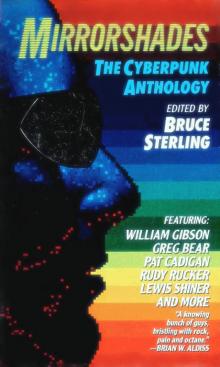 Mirrorshades: The Cyberpunk Anthology
Mirrorshades: The Cyberpunk Anthology The Wonderful Power of Storytelling
The Wonderful Power of Storytelling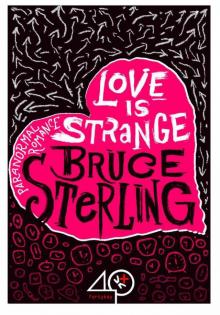 Love Is Strange (A Paranormal Romance)
Love Is Strange (A Paranormal Romance)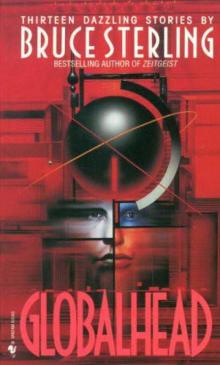 Globalhead
Globalhead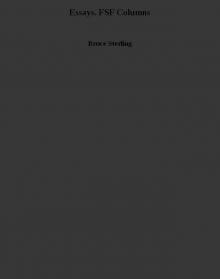 Essays. FSF Columns
Essays. FSF Columns The Hacker Crackdown
The Hacker Crackdown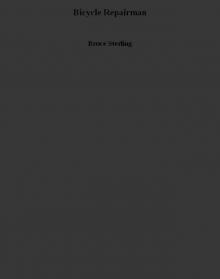 Bicycle Repairman
Bicycle Repairman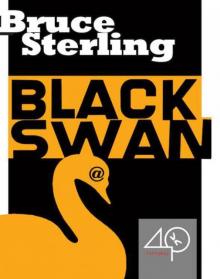 Black Swan
Black Swan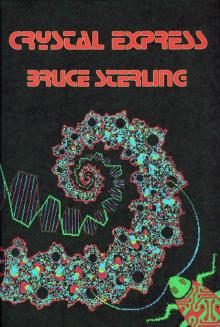 Crystal Express
Crystal Express Islands in the Net
Islands in the Net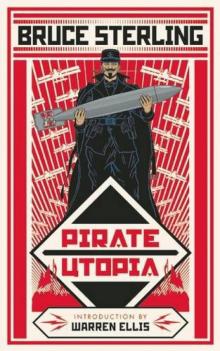 Pirate Utopia
Pirate Utopia GURPS' LABOUR LOST
GURPS' LABOUR LOST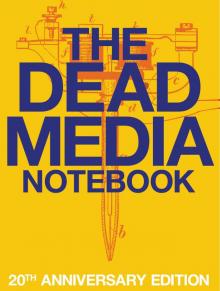 The Dead Media Notebook
The Dead Media Notebook Unstable Networks
Unstable Networks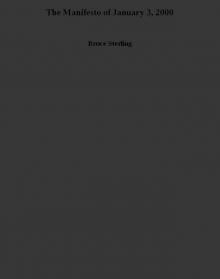 The Manifesto of January 3, 2000
The Manifesto of January 3, 2000 Heavy Weather
Heavy Weather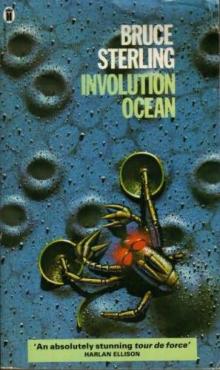 Involution Ocean
Involution Ocean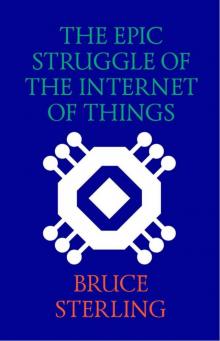 The Epic Struggle of the Internet of Things
The Epic Struggle of the Internet of Things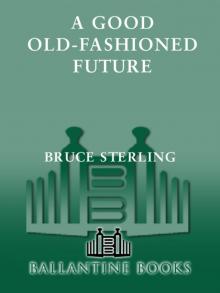 A Good Old-Fashioned Future
A Good Old-Fashioned Future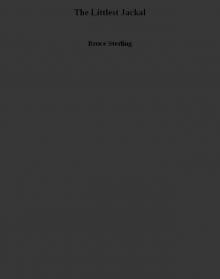 The Littlest Jackal
The Littlest Jackal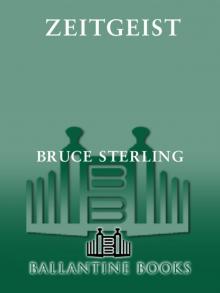 Zeitgeist
Zeitgeist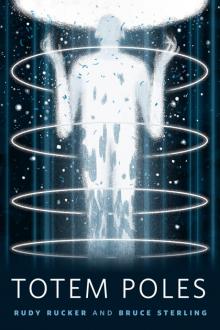 Totem Poles
Totem Poles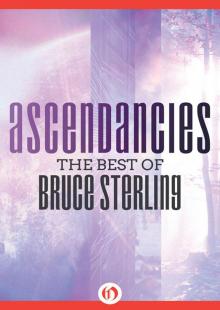 Ascendancies
Ascendancies CyberView 1991
CyberView 1991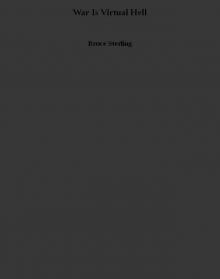 War Is Virtual Hell
War Is Virtual Hell Taklamakan
Taklamakan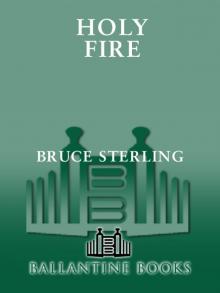 Holy Fire
Holy Fire Cyberpunk in the Nineties
Cyberpunk in the Nineties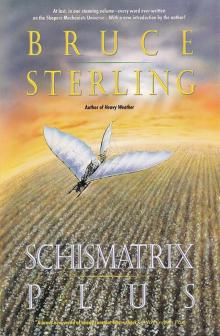 Schismatrix Plus
Schismatrix Plus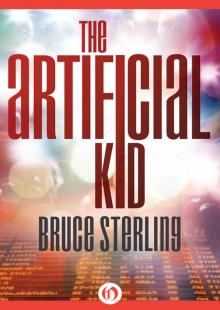 The Artificial Kid
The Artificial Kid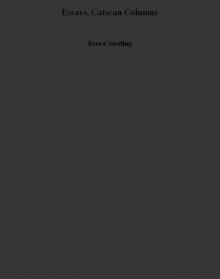 Essays. Catscan Columns
Essays. Catscan Columns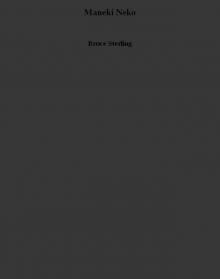 Maneki Neko
Maneki Neko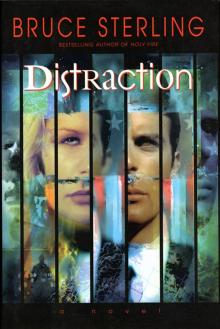 Distraction
Distraction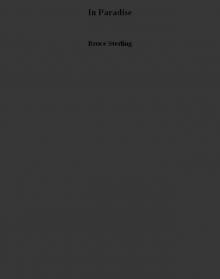 In Paradise
In Paradise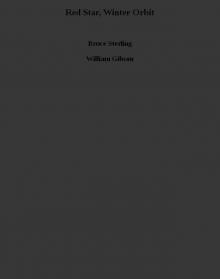 Red Star, Winter Orbit
Red Star, Winter Orbit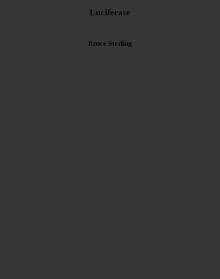 Luciferase
Luciferase